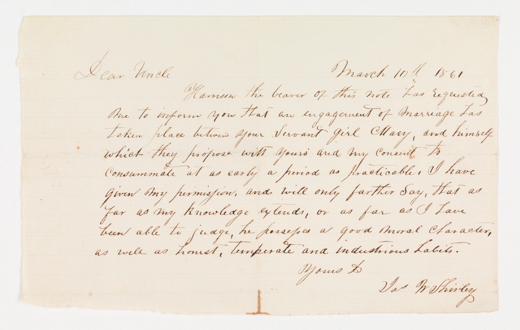New database allows people to search for slave ancestors
The Virginia Historical Society has introduced a searchable online database that will provide the public with essential facts and documents to help trace their ancestry to enslaved Virginians.
The Virginia Historical Society (VHS) has launched an online and searchable database that will help people from all over the world learn about their ancestry. Titled “Unknown No Longer: A Database of Virginia Slave Names,” the free service will be an ever-updating catalog that will feature a sizable portion of the over 8 million records in VHS archives.
Speaking of the benefits that the database will provide users in a telephone interview, Dr. Lauranett Lee, Curator of African American History at the VHS, said that people “can really get down to the nitty-gritty of research.”
Virginia was the largest slave-owning state until the end of the Civil War. Because slaves were treated as property and not people (in some instances, listed after cattle on property documents), records of familial genealogy are extremely difficult to procure. The new database will provide individuals looking for their Virginia-based genealogical history with these rare documents, documents that have the potential of providing accurate, and previously unknown, family origins. The database, as Dr. Lee said, “helps put flesh on raw data.”
Designing the site
The Virginia Historical Society hired Richmond-based HeliumStudio to design the database. Speaking about the project is Owner and Creative Director, Chris Hull:
- “The project appealed to us for a number of reasons, but ultimately we felt that this was an important project and we wanted to be involved. It was also exciting because we knew that the subject matter would lend itself to interesting design work.”
- “We worked closely with Virginia Historical Society staff during all stages of the project and their input was critical to the success of the project. It was a great collaborative effort. “
- “Most of the complexity was creating a back-end system that would allow the staff to easily associate people, documents, and locations without having duplicate efforts. This also created the ability for the user to find multiple records with only small amounts of information and potentially piece a family history together.”
Users will be able to search documents using several different criteria: name, occupation, a slave’s purchasing price, plantation name, among others. Dr. Lee recognizes that even the smallest, most seemingly minuscule factoid may inspire a chain reaction of information discovery that can help people uncover their familial origins. “Anything you can find,” said Dr. Lee of what can be a very onerous research process, “is really important.”
In February 2010, the VHS began extracting names from four existing collections. Later that year, Dominion Resources (provider of Virginia’s electricity) became interested in the project. They ultimately awarded the VHS a $100,000 grant.
When the database becomes available for public use later this week over 1,600 names will be accounted for–of which only about 300 will be the names of slave owners, the rest slaves. “This is just the beginning,” said Dr. Lee.
To digitize and upload the database content, items (deeds and slave purchase receipts, among other types of sources) are read and analyzed, entered into the data system (which includes scanning the images), and approved by the Vice President for Collections. “It’s a tedious process,” said Dr. Lee.
Since slave owners are also categorized and documented within the database, descendants of these owners can learn about this aspect of their family’s history. The history of both former and current Virginians “are so intertwined,” said Dr. Lee.
“This service will be of tremendous value to scholars, genealogists and the general public,” says Dr. Katherine Bassard, Professor of English at Virginia Commonwealth University, and author of the recent Transforming Scriptures: African American Women Writers and the Bible. “Because of the importance of names in the enslaved community, having a database that allows us to connect and reconnect these names down through the generations will restore dignity and honor to those who endured slavery in Virginia.”
It is Dr. Lee’s hope that those who begin their search online will extend their research process and use the VHS library, where archived documents are available for free and open to the public six days a week. She also hopes that it will inspire individuals to donate historical documents to the VHS to sustain the new database.
Related
-
Recommend this
on Facebook -

Report an error
-

Subscribe to our
Weekly Digest








Notice: Comments that are not conducive to an interesting and thoughtful conversation may be removed at the editor’s discretion.
Great news about a potentially great tool. Thanks for the report.
Thank you for this site. I am very interested in learning all I can about my slave ancestors in Virginia.
This is absolutely fascinating. Thanks for posting this!
My grandparents names were ben & Carrie Jones both from the Richmond, Bowling Green,and Hanover, Virginia area. Both lived and pass in Richmond.
What about Louisiana, Ive assumed my grandfather and grandmother family’s came in through that Slave route. Why? They were from Apalusus, and Ginerette ( if that’s spelled right).
i want to find out who my family is
This is a great idea, I only hope that it lives up to the hype
Want to find ancestors of Banks who resided in Georgia, Cooper who resided in Arkansas and Mississippi, Bland who resided in Georgia, Wilson who resided in Mississippi and Arkansas
The records department in Appromattox burned down and I would like to get information about my family